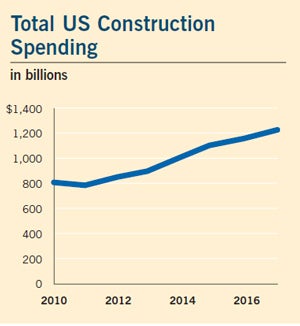BAC Executive Council: “Growing Our Union” Must Be the Highest Priority
JOURNAL: ISSUE 2 - 2017

Across North America, construction spending and employment is expanding tremendously. Cranes punctuate the horizons of many North American cities, and almost every state and province in BAC’s jurisdiction is booming. According to the research firm PricewaterhouseCoopers (PwC), globally, construction is expected to grow 70% by 2025 to $15 trillion – outpacing the GDP growth. In the U.S. alone, construction spending is expected to reach over $1.2 trillion in 2017, and the U.S. Government estimates that masonry employment will grow by 15%, or over 37,000 new jobs by 2024.
That’s why from April 18th to May 31st, the BAC Executive Board members traveled to all five BAC regions – South, West, Northeast, North Central, and Canada – to meet with Local leaders and members and visit jobsites. At these meetings, work opportunities for BAC members, organizing strategies, current industry trends, and many more issues that are closely related to our members were discussed.

“While we may be nearing a saturation point in our traditional public works and ‘big job’ markets, there are plenty of non-union craftworkers and contractors out there performing masonry, marble, tile, stone, and other core BAC work. They're just not always working on schools and hospitals. We need to organize them, and we need to organize their contractors,” BAC President James Boland said at the regional meetings. “Organizing is essential, and we must focus our energies more than ever before on organizing.”
To bolster BAC’s organizing efforts, on June 6th, President Boland convened the Executive Council Organizing Committee that is comprised of BAC Local and ADC Presidents from across North America. The Committee is responsible for coordinating and building organizing momentum, and developing strategies and best-practices for all BAC Locals/ADCs can adopt.
In his opening remarks, President Boland stated, “While many things have changed for our union and construction, the principles of organizing have not changed. Locals must prepare themselves for organizing by doing their homework, educating and engaging their members, and by building relationships.”
“Craftworkers don’t sign with the International Union. They join Local unions,” President Boland told the Committee. “Locals with effective organizing programs have a few things in common: dedicated organizing staff, specific plans and organizing targets, member-based committees, craft and member diversity on the committees, and tenacity.”
“A simple fact confronts our union,” President Boland added. “BAC must organize more non-union journey workers, expand its contractor base, and more aggressively include newer materials and techniques within its craft base. Crafts like rain screen and large format tile are our future, and the viability of our funds, our Union, our livelihoods, and our crafts depends on our ability to make this change.”
BAC has set an aggressive goal for 2017 - all BAC Locals and ADCs will be actively organizing new members and contractors with organizing committees. If you are interested in supporting their activities, contact your Local/ADC to volunteer.
